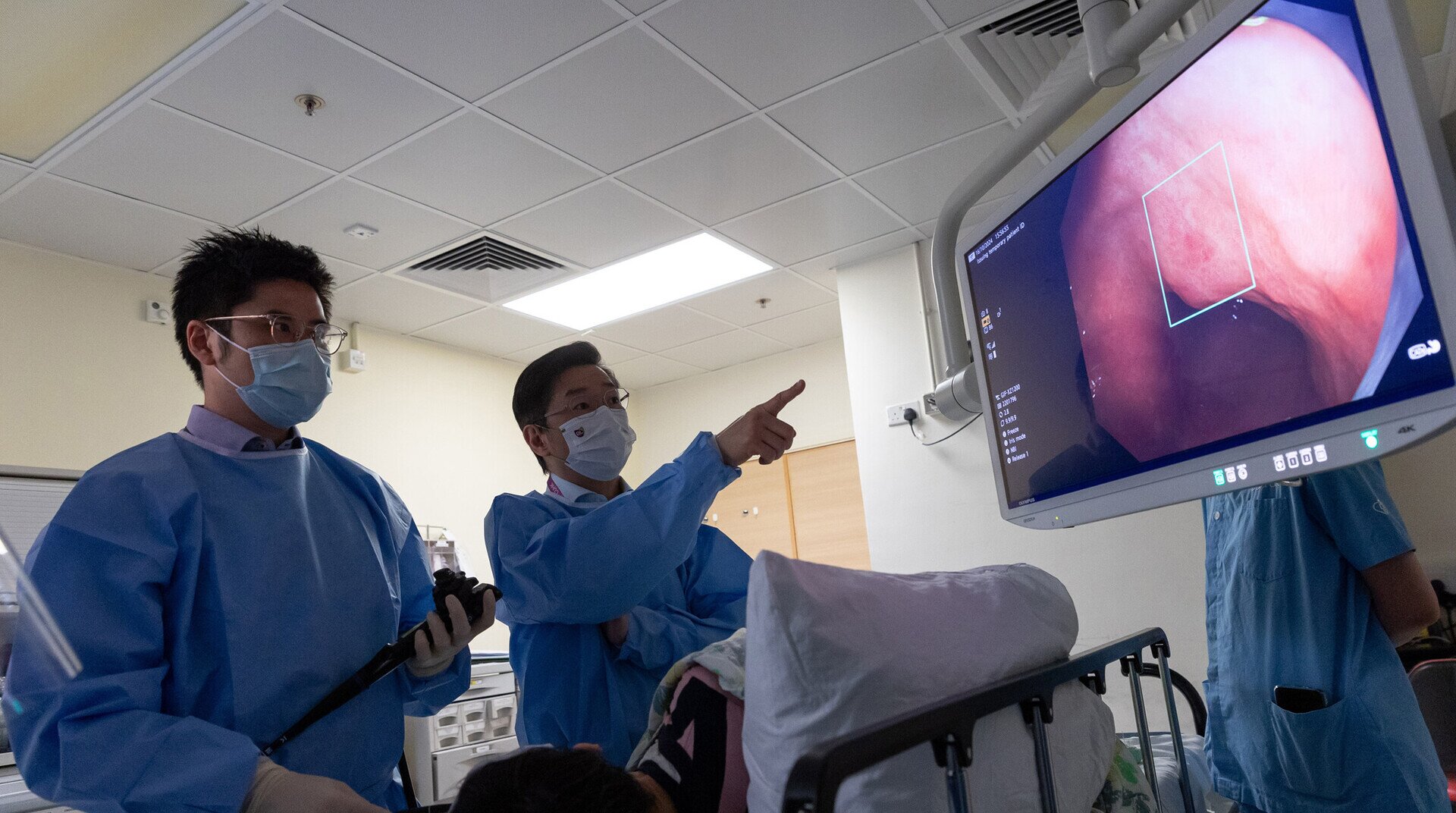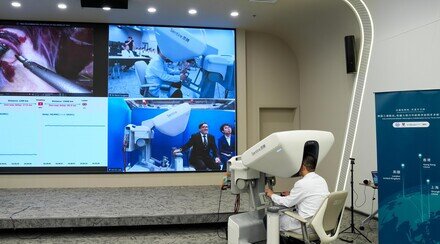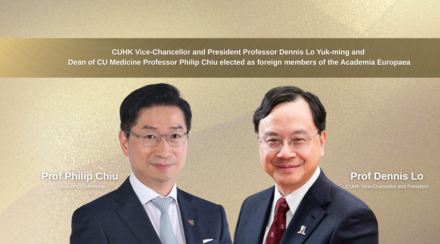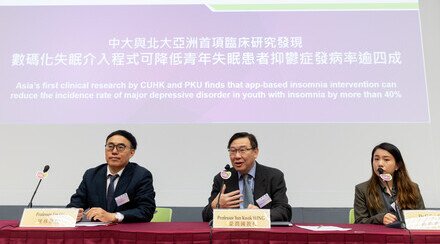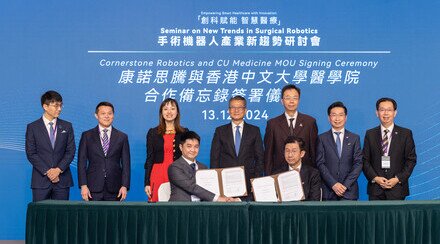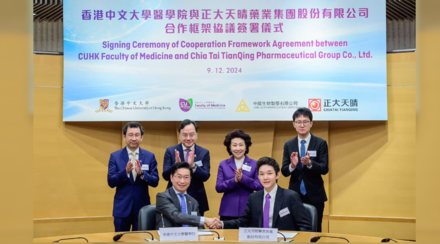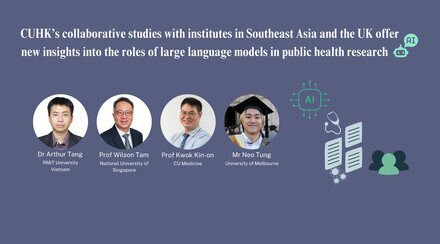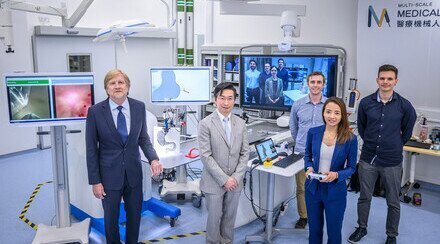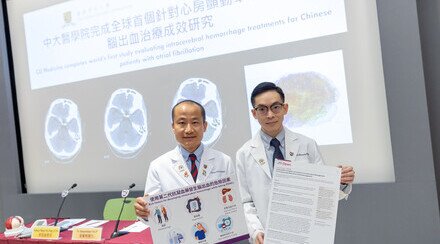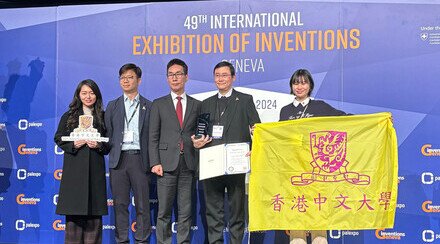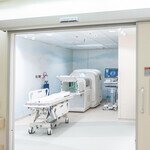CU Medicine pioneers the introduction of a novel AI system for detection of early gastric cancers during upper GI endoscopy to increase the detection rate of the disease and facilitate endoscopists’ training
The Chinese University of Hong Kong’s (CUHK) Faculty of Medicine (CU Medicine) recently became the foothold of the world’s first centre to test a novel AI-powered upper gastrointestinal endoscopy system for the detection of gastric cancers. Given the success of AI-assisted colonoscopy, the team believes that the new technology will enhance the accuracy of detecting early gastric cancers and train endoscopists.
CU Medicine has engaged in clinical research in endoscopic and laparoscopic devices since the 1980s and translated novel endoscopic devices and technologies from bench to bedside. It introduced AI-powered colonoscopy detection as early as 2021. Studies proved that the technology not only contributed to a 40% increase in the adenoma detection rate but also improved the training of less experienced physicians.
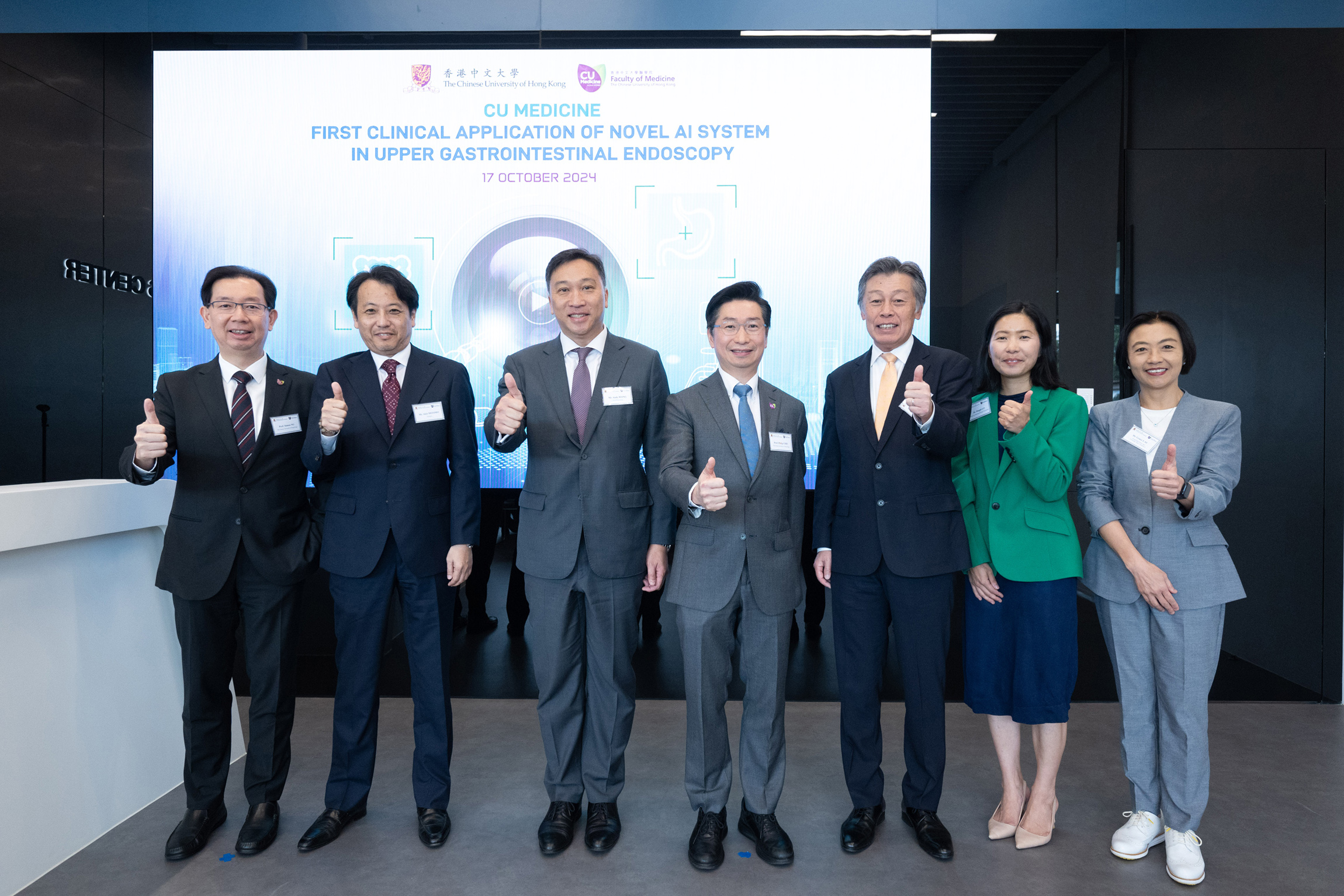
CU Medicine signed an MoU with Olympus Corporation (Olympus) last year to strengthen partnerships in innovative endoscopy and laparoscopy technologies. It became the world’s first centre to test the company's AI-powered upper GI endoscopy system.
(From left) Professor Simon Ng Siu-man, Chairman of the Department of Surgery at CU Medicine; Mr Akio Mitomo, Head of Medical Business, Olympus Corporation of Asia Pacific Limited; Mr Andy Wong Wai-cheuk, Head of Innovation and Technology of Invest Hong Kong, HKSAR Government; Professor Philip Chiu, Dean of CU Medicine; Ambassador Kenichi Okada, Consul-General of Japan in Hong Kong; Dr Maggie Lo Ching-man, Senior Vice President (Life and Health Technology) of the Office for Attracting Strategic Enterprises, HKSAR Government; and Dr Grace S. N. Lau, Head of Institute for Translational Research of Hong Kong Science and Technology Parks Corporation, at the kick-start ceremony of the project.
CU Medicine completed the world’s first test of novel AI-powered upper gastrointestinal endoscopy
Professor Philip Chiu Wai-yan, Dean of CU Medicine, Shun Hing Education and Charity Fund Professor of Robotic Surgery, Cluster Director of Endoscopy of the Hospital Authority’s New Territories East Cluster, and Director of Endoscopy Centre at the Prince of Wales Hospital, said: “CU Medicine is delighted to become the world’s first centre to test the AI-powered upper GI endoscopy system developed by Olympus Corporation (Olympus), as part of our deepened partnership beginning last year with the biggest manufacturer of medical endoscopes in the world, strengthening innovative endoscopy and laparoscopy technologies. Riding on our previous success in AI-powered colonoscopy research, we believe that the new technology will have a major impact on the detection of early gastric cancer for patients’ benefit worldwide. The new AI endoscopic system is distinguished by its ability to (i) detect flat, early gastric cancers, (ii) identify early gastric cancers without high colour contrasts or colour change, and (iii) reduce the missing rate of early gastric cancer caused by less experience as well as fatigue for endoscopists.’’
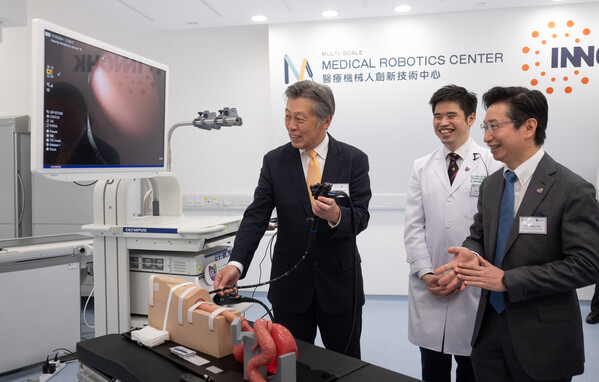
Professor Philip Chiu (right) introduces the mechanism of the novel AI-powered upper GI endoscopy system to Ambassador Kenichi Okada (left), Consul-General of Japan in Hong Kong. Mr Okada says given the unique international characteristics of Hong Kong, the achievement of this collaboration can be shared with every patient in the world.
Ambassador Kenichi Okada, Consul-General of Japan in Hong Kong, said: ‘‘As an important partner of Japan, Hong Kong has served as an important gateway to the world. The collaboration between CU Medicine, the world’s top-class medical school, and Olympus, a world leader in endoscopic treatment devices, has marked a significant milestone. Given the unique international characteristics of Hong Kong, the achievement of this collaboration can be shared with every patient in the world.’’
Ms. Lillian Cheong Man-lei, Under Secretary for Innovation, Technology and Industry, said: ‘‘Life and health technology has always been the key pillar of Hong Kong’s scientific development and the integration of AI in clinical application is a prominent global trend. The collaboration between CU Medicine and Olympus is critical to the translation of advanced technology and innovations into direct benefits for patients, which is well in line with the government’s vision of positioning Hong Kong as an International Health & Medical Innovation Hub.’’
The long progression and multiple morphological variations of gastric cancers make early detection a challenge
Gastric cancer is formed by the abnormal proliferation of mucosal cells in the human stomach, which changes from inflammation of the gastric mucosa to atrophic gastritis and intestinal metaplasia and evolves ultimately into cancer after years of progression to abnormal cell proliferation. As symptoms of early gastric cancer are subtle, about 80% of gastric cancer patients in Hong Kong have progressed to the moderate and advanced stages by the time they are detected, making surgical treatment, chemotherapy and rehabilitation tremendously difficult. According to 2021 data from the Hong Kong Cancer Registry, gastric cancer is the sixth most common cancer in Hong Kong, with about 1,300 new cases and more than 600 deaths each year. These figures reflect the difficulty of treating gastric cancer. The five-year survival rate for moderate and advanced gastric cancer is usually 30% to 40%. By contrast, the five-year survival rate for early gastric cancer generally exceeds 90%. Hence, being able to detect early-stage gastric cancer has a significant impact on patients’ survival rates and treatment outcomes. Once early gastric cancer is detected, it can even be resected endoscopically to save patients from the need to undergo major gastrectomy surgery.
Dr Louis Lau Ho-shing, Assistant Professor, Department of Medicine and Therapeutics, CU Medicine, said: ‘‘Endoscopy is the most commonly used and most direct approach to detect gastric cancers. Nonetheless, as certain lesions of early gastric cancers are small and insignificant in terms of characteristics, and given the limitations caused by the size, shape and location of the diseased tissues, these lesions are extremely difficult to detect through traditional endoscopy. The global detection rate of early gastric cancers is less than 10% globally but can be as high as 60% in Japan. As endoscopy is a specialty in Japan, endoscopists are able to focus intensely on the detection of early gastric cancers and gain access to a massive number of gastric cancer cases. Through AI learning, doctors from various places may be able to make use of their relevant experience to improve the detection rate.’’
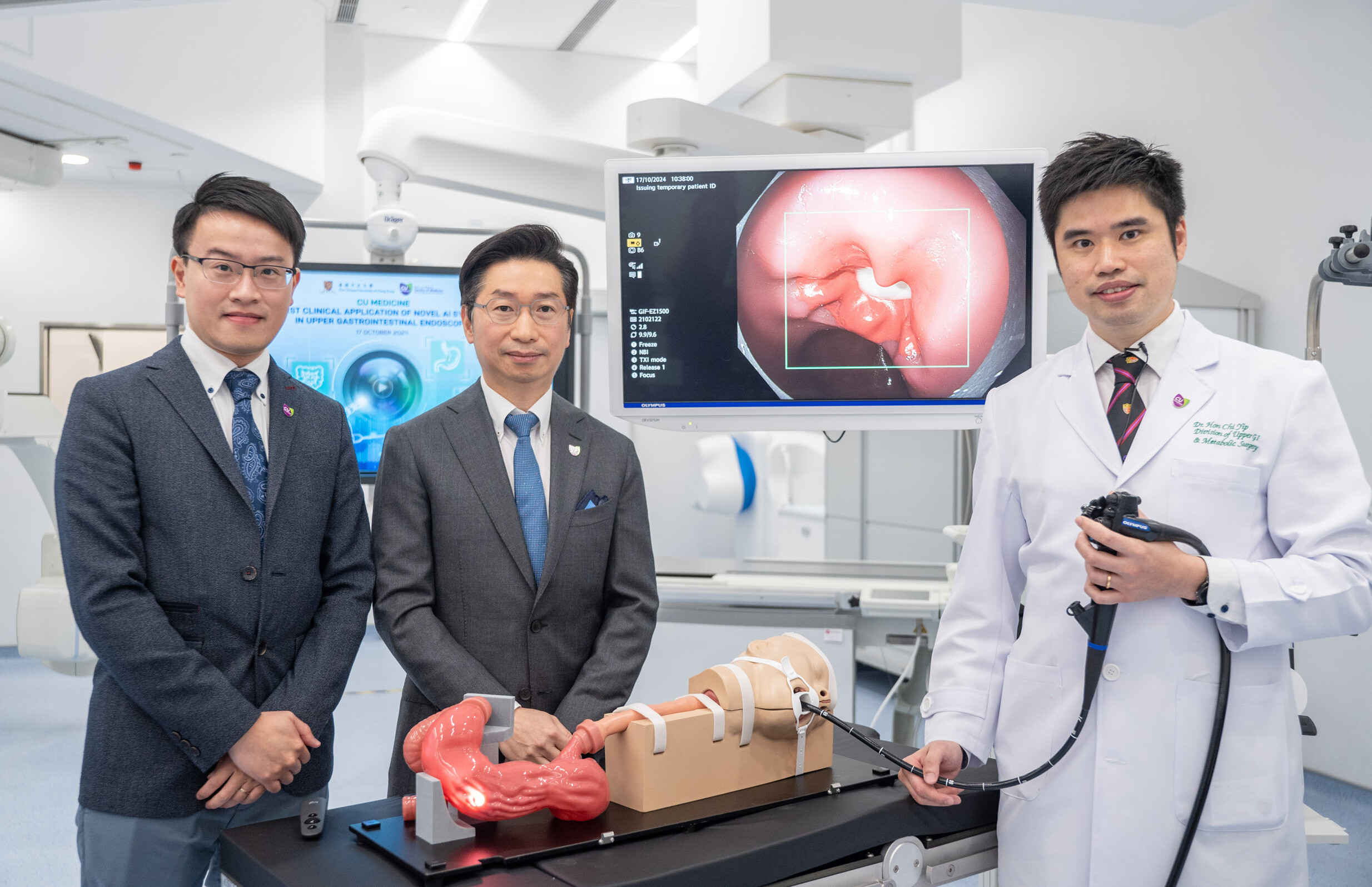
CU Medicine recently became the foothold of the world’s first centre to test a novel AI-powered upper gastrointestinal endoscopy system for detecting gastric cancers. Research team members include (from left) Dr Louis Lau, Assistant Professor in the Department of Medicine and Therapeutics; Professor Philip Chiu Wai-yan, Dean of CU Medicine; and Dr Yip Hon-chi, Assistant Professor in the Department of Surgery at CU Medicine.
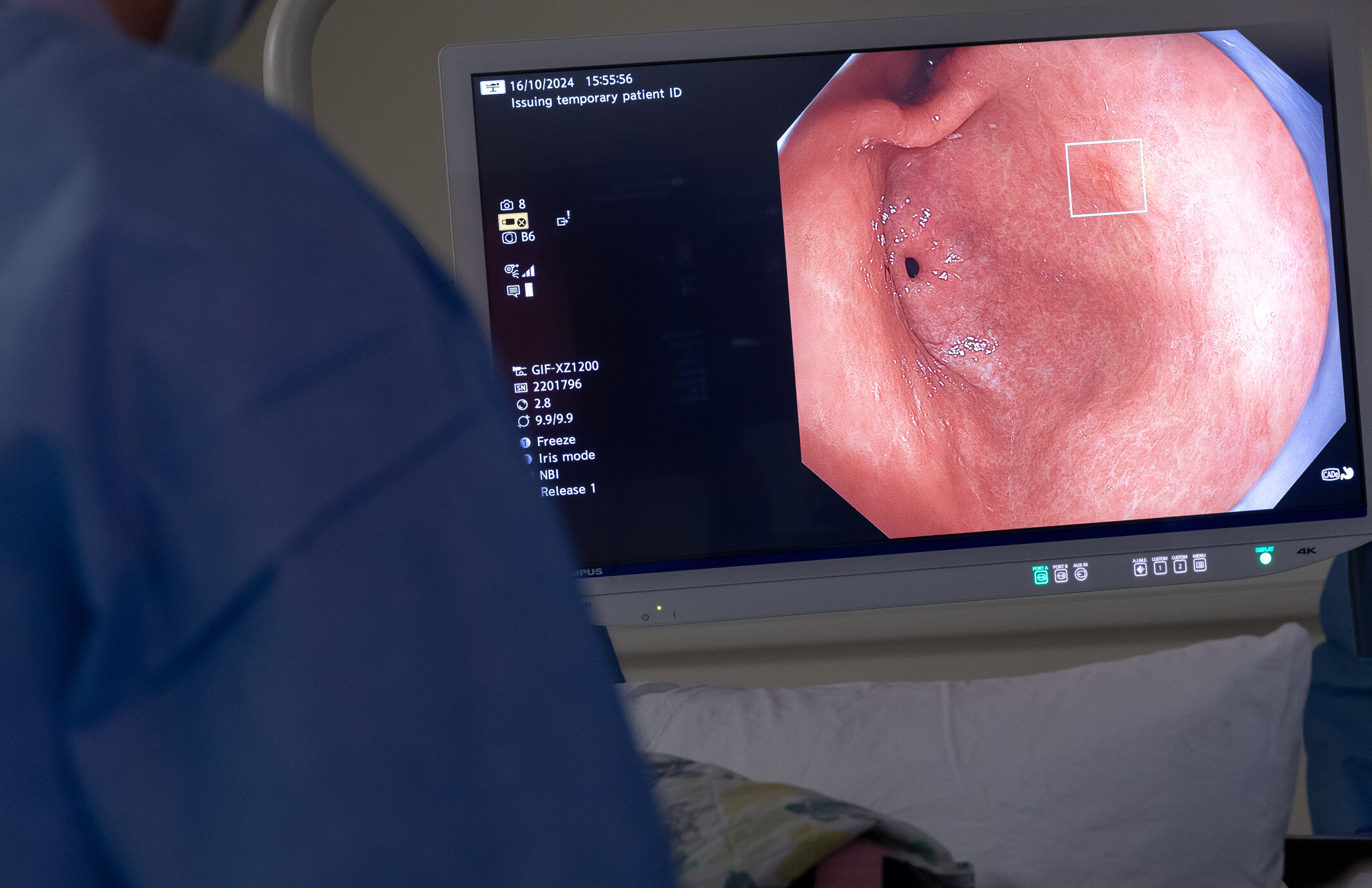
The new AI-powered upper gastrointestinal endoscopy system uses numerous gastric cancer endoscopic images in Japan for deep learning with high-quality annotations by Japanese expert doctors, which enables it to identify gastric cancer while anchoring the lesion location and the scope of carcinogenesis for doctors’ reference during clinical observation. The new AI endoscopic system is distinguished by its ability to detect flat, early gastric cancers; identify early gastric cancers without high colour contrasts or colour change and reduce the missing rate of early gastric cancer caused by less experience as well as fatigue for endoscopists.
Innovative AI technology enables the identification of gastric polyps and cancers, lesion location and the extent of carcinogenesis
The new AI-powered upper gastrointestinal endoscopy system uses numerous gastric cancer endoscopic images in Japan for deep learning with high-quality annotations by Japanese expert doctors, which enables it to identify gastric cancer while anchoring the lesion location and the scope of carcinogenesis for doctors’ reference during clinical observation.
Dr Yip Hon-chi, Assistant Professor, Department of Surgery, CU Medicine and Deputy Director of the Endoscopy Centre at the Prince of Wales Hospital, said: ‘‘AI-assisted technologies can provide specific real-time guidance, which facilitates doctors’ learning and training more systematically while substantially mitigating the chance of missing precancerous lesions in the stomach. In general, AI can help all doctors, regardless of their experience, to increase the early tumour detection rate and identify individuals at high risk of gastric cancer as early as possible. In addition, reference data regarding the scope of carcinogenesis will also help doctors perform endoscopic submucosal dissection (ESD) to treat early gastrointestinal cancer.’’


